

From Trash to Space Hippie: Nike shoes made from waste. Solid Waste Management. Context Around the world, waste generation rates are rising.
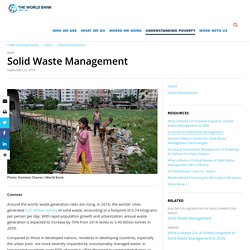
In 2016, the worlds’ cities generated 2.01 billion tonnes of solid waste, amounting to a footprint of 0.74 kilograms per person per day. With rapid population growth and urbanization, annual waste generation is expected to increase by 70% from 2016 levels to 3.40 billion tonnes in 2050. Compared to those in developed nations, residents in developing countries, especially the urban poor, are more severely impacted by unsustainably managed waste.
US top of the garbage pile in global waste crisis. Image copyright Getty Images The world produces over two billion tonnes of municipal solid waste every year, enough to fill over 800,000 Olympic sized swimming pools.
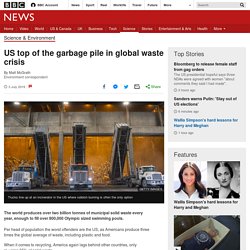
Per head of population the worst offenders are the US, as Americans produce three times the global average of waste, including plastic and food. When it comes to recycling, America again lags behind other countries, only re-using 35% of solid waste. Germany is the most efficient country, recycling 68% of material. Tokyo 2020 Olympic Medals Are Made From Recycled Cell Phones And Gadgets Kids News Article. Japan, the host country of the 2020 Olympic and Paralympic Games, has promised to deliver "the most innovative Games ever organized.
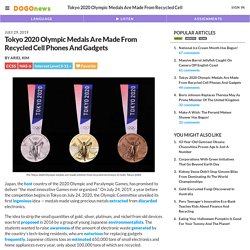
" 5 Cleaning Strategies from 5 of the Cleanest Cities. What exactly are the cleanest cities in the world doing to keep their districts so clean?

Zoom out for a moment and discover 5 strategies for cleanliness taken from 5 of the cleanest cities in the world. 1. Think small like Singapore. The city-state of Singapore maintains its cleanliness by considering the little things. Stickers in bathrooms remind citizens to always flush the toilet. While you probably won’t be outlawing chewing gum anytime soon, Singapore has established a high level of cleanliness with consistency in minor actions. 30 Cities to Visit That Are Really, Really Clean. Kids Guide to Recycling - ReuseThisBag.com. Recycling is important to preserve the environment and to leave the planet in a better condition than we found it.
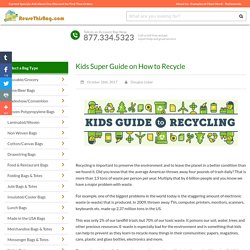
Did you know that the average American throws away four pounds of trash daily? That is more than 1.5 tons of waste per person per year. Multiply that by 6 billion people and you know we have a major problem with waste. Qantas rubbish-free flight takes off. The world’s first “waste-free” flight took off from Sydney and landed in Adelaide this week, with every disposable item on board to be composted, reused, or recycled.

The Qantas flight is the airline’s first step towards its goal of cutting out 100 million single-use plastic items from its operations. Passengers raised their concerns with the airline about the amount of rubbish being created on flights, prompting* Qantas chief executive Alan Joyce to announce the goal in February. Every year, Qantas creates a total of 30,000 tonnes of rubbish on flights. Qantas Domestic chief Andrew David said the Sydney to Adelaide one-way flight would normally create 34kg of waste from food and drink packaging and other items such as boarding passes.
“Over the course of a year this route produces 150 tonnes of waste — eventually all of that will go,” Mr David said. He said the move was necessary to keep customers, employees* and shareholders* happy. “You see (the waste) every day, you touch and feel it. 2. Hobart bans single-use plastics. Hobart will be the first Australian city to ban single-use plastics.
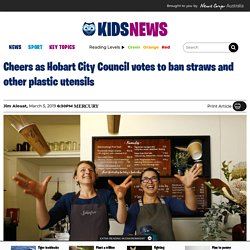
The Hobart City Council in Tasmania approved the single-use plastics bylaw* which will ban single-use, petroleum-based* plastic containers and utensils* next year. The ban will apply to plastic cups, lids, utensils, straws and condiment sachets such as tomato sauce packets. As the bylaw was approved on Monday night, cheering and clapping broke out among those watching. Councillor Bill Harvey, who moved the motion*, said it was a bold decision.
Recycling Problem - Classroom - BTN. LEELA VARGHESE, REPORTER: I don't know about you, but I'm often kept up at night wondering, "after I put my recycling in the yellow bin, where are they taking it?
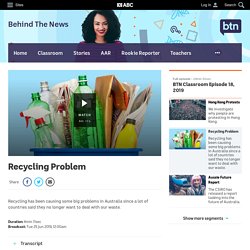
Where? " MATT: Have you been up all night stressing out about the recycling again? Why don't you just investigate? Right. A mission. Bread tag bowls - Newsbreak - Behind The News - BTN. A South Australian recycler has found a way to turn the humble bread tag into something useful.

Thanks to a partnership with charity Aussie Bread Tags for Wheelchairs, Brad Scott is turning the little plastic bits into bowls and doorknobs. The charity collects thousands of tags from around the country and sends 50 kilograms a month Mr Scott's recycling business in Robe. "I can do bread tags, or any sort of polystyrene, Styrofoam, all the types of plastic, but I didn't have this sort of volume of bread tags," Mr Scott said. Mr Scott receives 50kg of bread tags each month, and the local Men's Shed and aged care residents have volunteered to help sort them into separate colours. Image: ABC South East: Selina Green. How to reduce your impact on the environment this Christmas. We’ve been taught to reduce our use of single-use plastics as much as possible, so why aren’t we reducing the single-use Christmas gifts we’re giving?
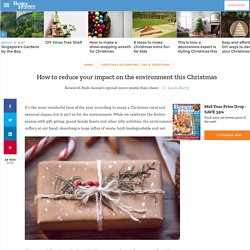
According to the research, $8.7 billion is spent on gifting during the festive season, and $512 million is spent on wrapping paper. Corporations With Green Initiatives That Go Beyond Earth Day Kids News Article. War on Waste - Science,Geography (3,4,5,6,7,8,9,10) Windmill warriors. Reducing plastic bag use - Geography,Science (4,7) Sustainable Development Goals. Sustainable Development Goals End poverty in all its forms everywhere End hunger, achieve food security and improved nutrition and promote sustainable agriculture Ensure healthy lives and promote well-being for all at all ages Ensure inclusive and equitable quality education and promote lifelong learning opportunities for all Achieve gender equality and empower all women and girls.